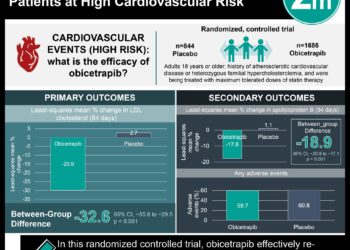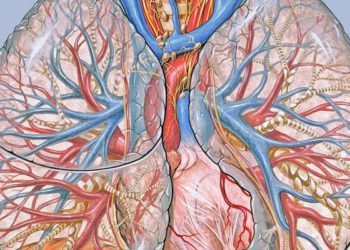ST-elevation myocardial infarctions in the absence of standard modifiable cardiovascular risk factors may have worse outcomes
1. Patients without standard modifiable cardiovascular risk factors (SMuRFs) had a significantly higher all-cause mortality at 30 days after first presentation of STEMI.
2. Patients without SMuRFs were significantly less likely to receive statins, ACEIs, ARBs, or beta-blockers at discharge.
Evidence Rating Level: 2 (Good)
Study Rundown: Standard modifiable cardiovascular risk factors (SMuRFs: smoking, hypertension, diabetes, and hypercholesterolemia) significantly increase the risk of ST-elevation myocardial infarction (STEMI). However, a notable proportion of patients with no previous symptoms and no modifiable risk factors (SMuRF-less) present with severe myocardial infarction. SMuRF-less patients are often overlooked in the provision of effective and timely care, resulting in preventable complications. This study aimed to analyze the short-term and long-term clinical outcomes for patients with first presentation STEMI without SMuRFs and those with at least one modifiable risk factor. The primary outcome was all-cause mortality at 30 days after STEMI, whereas secondary outcomes included cardiovascular mortality, heart failure, and myocardial infarction. According to study results, SMuRF-less patients had a significantly higher all-cause mortality rate at 30 days after first presentation. They were also less likely to receive statins, angiotensin converting enzyme inhibitors (ACEIs), angiotensin receptor blockade (ARB), or beta-blockers at discharge. This study was strengthened by a longitudinal follow-up design as patient data was collected for up to 12 years after episode of STEMI. Overall, this study provides valuable insight into use of short-term pharmacotherapy during the acute post-infarct period, regardless of perceived risk.
Click to read the study in The Lancet
Relevant Reading: Coronary Angiography after Cardiac Arrest without ST-Segment Elevation
In-depth [retrospective cohort]: Between Jan 1, 2005, and May 25, 2018, 74 679 patients were assessed for inclusion into the study. Included patients were ≥18 years of age with suspected acute coronary syndrome and a hospital diagnosis of STEMI. Patients with a history of coronary artery disease (i.e., percutaneous coronary intervention, coronary artery bypass graft, or myocardial infarction) were excluded. Altogether, 62 048 patients (of which 9228 were SMuRF-less) were included in the analysis. Median age was similar between patients with SMuRFs (68 years, interquartile range [IQR] 59-78) and those without (69 years, IQR 60-78, p<0.0001).
Among SMuRF patients (n=52 820), common risk factors were hypertension (70.4%), hypercholesterolemia (48.4%), current smoking (32.6%), and diabetes (21.3%). SMuRF-less patients had a significantly lower LDL-C, body-mass index (BMI), HbA1c, systolic blood pressure, and heart rate than SMuRF patients. They were also less likely to receive statins, angiotensin converting enzyme inhibitors (ACEIs) or angiotensin receptor blockage (ARB), and B-blockers upon discharge. However, the rate of percutaneous coronary intervention was similar between both groups. The primary outcome of all-cause mortality at 30 days was significantly higher in SMuRF-less patients than SMuRF patients (hazard ratio [HF] 1.47, 95% confidence interval [CI] 1.37-1.57, p<0.0001). This was true after adjusting for age, sex, left ventricular ejection fraction, creatinine, and blood pressure. SMuRF-less patients had a significantly higher in-hospital mortality rate (n=883, 9.6%) than their counterparts (n=3411, 6.5%, p<0.0001). Secondary outcomes of myocardial infarction and heart failure at 30 days after STEMI were lower in SMuRF-less patients; although, all-cause mortality remained elevated in SMuRF-less men for more than 8 years and SMuRF-less women for more than 12 years. Findings from this study suggest that SMuRF-less STEMI patients have a higher risk of mortality than those with one or more standard risk factor.
Image: PD
©2021 2 Minute Medicine, Inc. All rights reserved. No works may be reproduced without expressed written consent from 2 Minute Medicine, Inc. Inquire about licensing here. No article should be construed as medical advice and is not intended as such by the authors or by 2 Minute Medicine, Inc.






